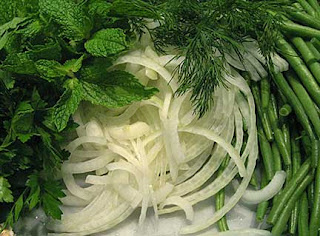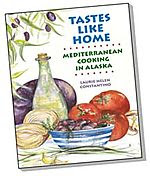 My mouth began watering for Green Bean and Tomato Stew (Fasolakia) the minute I saw that Anchorage’s Costco had begun carrying two pound bags of green beans. Two pounds is the exact amount needed to make Fasolakia, a recipe in Tastes Like Home: Mediterranean Cooking in Alaska.
My mouth began watering for Green Bean and Tomato Stew (Fasolakia) the minute I saw that Anchorage’s Costco had begun carrying two pound bags of green beans. Two pounds is the exact amount needed to make Fasolakia, a recipe in Tastes Like Home: Mediterranean Cooking in Alaska.
Fasolakia is familiar to patrons of old-style restaurants in Greece where customers are invited into the kitchen to choose from the day’s specials. My version is based on the countless bowls of Fasolakia I have enjoyed sitting under shade trees in outdoor restaurants, eating slowly to make it last, sipping wine, and watching the world go by.
The earthy bean flavor in Fasolakia, together with the sweetness of onion, the rich luxurious taste of tomatoes, and the fresh flavors of parsley, mint, and dill makes this an exceptional dish. Sometimes, when I want a heartier stew, I add chunks of peeled potatoes to the pot.
I’ve made myself hungry writing this. Luckily, there is leftover Fasolakia in the refrigerator.




3 comments:
Fasolakia? Wow, this is interesting. We make this dish and I was just talking about it with another food blogger.Of course we don't call it fasolakia. We are Italian. We really don't have a name for it.I always say that Bari has a big Greek influence and so some dishes are very similar.Now, did the Italians bring it to Greece or did the Greeks bring it to Italy? haha Which ever way, it is great and I also add potatoes!
You're right, it is interesting. I had no idea this was an Italian dish too. Fasolakia is one of a number of dishes that, in Greek, are generically known as Ladera, which means "oily dishes." (In Tastes Like Home, I cut down significantly on the amount of oil used.) These dishes are common to many of the countries in which the Ottoman empire once held sway. As to who invented it, that is a topic I wouldn't touch with a ten-foot pole!! The Greeks and the Turks are always arguing about who invented what, and to throw the Italians into that fight is just too much. But I agree, it's a great dish and one of my favorites.
Here's a thought-provoking article by a Turkish sociologist named Zafer Yenal about the relationship between nationalism and cuisine: http://tharwacommunity.typepad.com/tharwa_review/2007/06/the_connection_.html
The author says that trying to ascribe a national identify to a recipe is "utter nonsense": "All these dishes have been transported from place to place for centuries. Different peoples prepare them in their own way and eat them in their own way. In the process, these dishes have absorbed something from every location and changed along the way." Yenal goes on to discuss the risks of excess nationalism; the article is worth reading.
Post a Comment